News & Media
Tackling risk management and governance in higher education
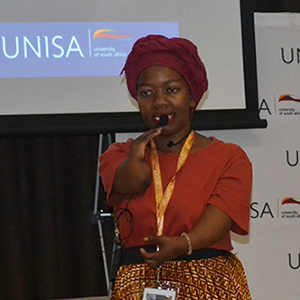
Daphney Twala, a poet and member of the National Council of Persons with Disabilities (NCPD)
Unisa held its 2019 Chapter of the Strategic Risk Leadership Conversations on Higher Education (SRLC-HE) event with the theme "Disruptions at the base of the pyramid – (therein) unfolds a paradox". The aim was to deepen the risk culture and strengthen the governance texture within organisations. The discussions also looked at what it takes to disrupt the status quo while seizing emerging innovative opportunities, such as how to contribute towards strategic resilience for individuals, organisations, our country and the continent of Africa.
Since 3 December is the International Day of Persons with Disabilities, which is also commemorated as National Disability Rights Awareness Day, Unisa took the opportunity to briefly create awareness on disability issues. Daphney Twala, a poet and member of the National Council of Persons with Disabilities (NCPD) delivered "sereto sa Unisa (Unisa Praises)". She praised Unisa for promoting inclusivity of students or persons with disabilities and supporting them throughout their studies, and also for making higher education accessible to those from underprivileged backgrounds. The programme director, Sedzani Musundwa, who is an academic at Unisa, highlighted that higher education institutions do not exist outside the society, but what happens in the society affects us.
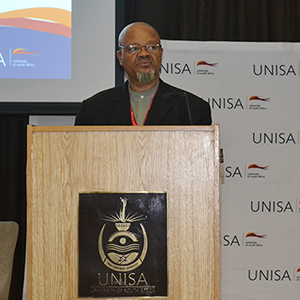
Prof Mandla Makhanya, Unisa's Principal and Vice-Chancellor
Unisa’s Principal and Vice-Chancellor, Prof Mandla Makhanya, delivered a word of welcome and overall perspective on higher education in South Africa. He highlighted that South African higher education does not function in isolation, but is shaped and informed by what is happening globally and continentally. He added that much of the transformation is driven by technological and digital advances. "Changes in society, technology and social media have changed the way we learn. In many cases, the state of our universities mirrors the state of our nation," he expressed.
The keynote speakers were Prof Mervyn E. King (King IV), Senior Counsel and former Judge on the Supreme Court of South Africa, and Advocate Willie Hofmeyr, Deputy National Director of Public Prosecutions at the National Prosecutions Authority of South Africa. King presented on "The environmental, social and governance factors as a distinctive competence for corporate leaders – a Higher Education perspective". Hofmeyr presented on "Re-tilting the ethic landscape: A slippery slope to steep a climb?" King stated that conscious leadership means leading from a higher state of awareness. Hofmeyr explained how the manipulation of state systems is a serious ethical problem in the state.
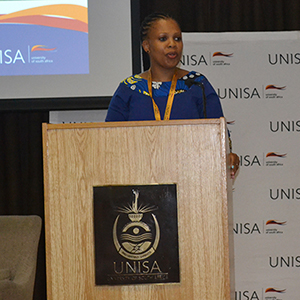
Nomathamsanqa Ashom, Director of Assurance Services at Ngubane & Co.
In light of gender-based violence in higher education, Unisa’s Deputy Chairperson of the Audit and Enterprise Risk Management Committee of Council, Phillip Ntsimane, lauded Unisa for being proactive and distributing pepper sprays to female students to use as protective measure. Nomathamsanqa Ashom, the Director of Assurance Services at Ngubane & Co., addressed the question of what it would take to achieve the making of a globally smart professional, whose global mobility is underpinned by a solid cross-cultural literacy. She urged organisations to put effort in creating cultural awareness and encouraged everyone to have the willingness to learn about other cultures.
Dr Somadoda Fikeni, Unisa’s Executive Director of Special Projects and Advisor to the Principal and Vice-Chancellor, was also given an opportunity to make a presentation. "When you plan a strategy for any organisation, the first thing that ought to be done is to analyse and understand the mega trends that are key drivers in the world, such as global warming and environmental degradation. The fourth industrial revolution (4IR) where the computing power is growing exponentially with the convergence of human functions, and those of computers, robots and so forth. What are the ethical considerations and implications for employment?" he asked.
The sponsors of the event were the Institute of Risk Management South Africa (IRMSA), Ngubane & Co., the University of Johannesburg (UJ) and SafeCyberLife who also contributed immensely to the conversation around risk and governance within the higher education sector.
* By Nancy Legodi, Acting Journalist, Publications: Department of Institutional Advancement
Publish date: 2019-12-10 00:00:00.0

 Young Unisa doctoral graduate joins elite Lindau Nobel Laureate group
Young Unisa doctoral graduate joins elite Lindau Nobel Laureate group
 Education MEC addresses Unisa autism seminar
Education MEC addresses Unisa autism seminar
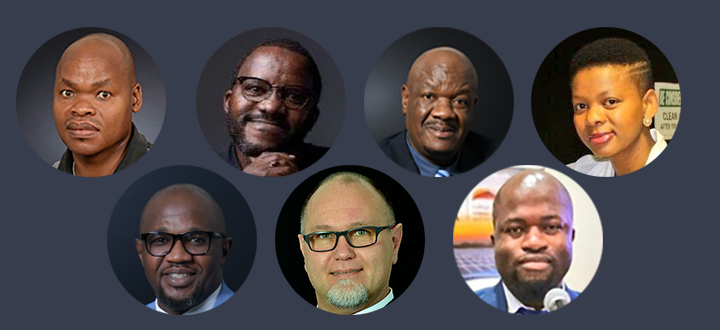 Seven Unisans nominated for the NSTF-South32 Awards 2023/2024
Seven Unisans nominated for the NSTF-South32 Awards 2023/2024
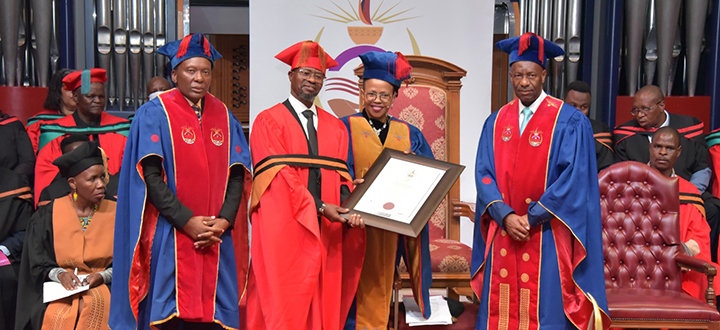 Unisa awards posthumous honorary doctorate to literary maven, OK Matsepe
Unisa awards posthumous honorary doctorate to literary maven, OK Matsepe
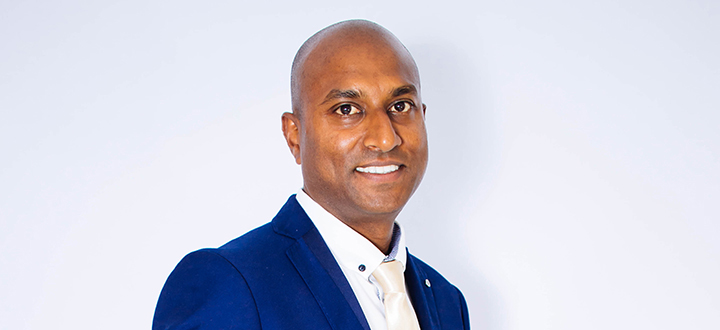 From humble beginnings to academic leadership
From humble beginnings to academic leadership